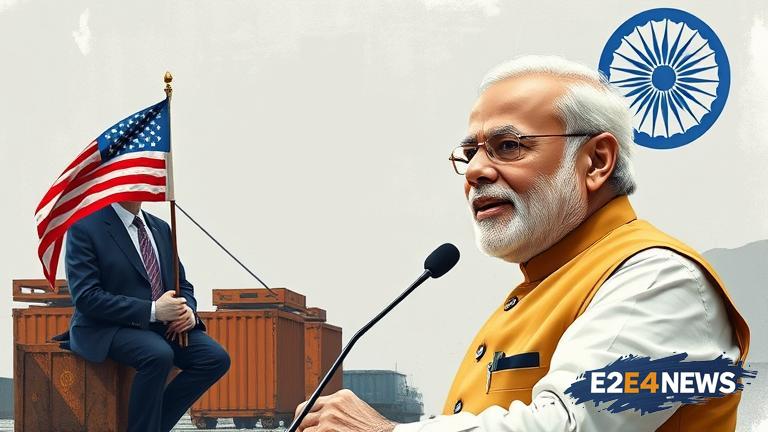The United States’ 50% tariffs on certain Indian goods are scheduled to kick in, sparking concerns among Indian exporters. In response, Prime Minister Narendra Modi has emphasized the need for self-reliance and domestic production to reduce dependence on foreign markets. The tariffs, which were announced earlier this year, will affect a range of Indian products, including textiles, chemicals, and pharmaceuticals. Indian exporters are bracing themselves for the impact, with many expecting a significant decline in sales. The Indian government has been engaged in talks with the US to try and resolve the issue, but so far, no agreement has been reached. PM Modi has been vocal about the need for India to reduce its reliance on foreign markets and instead focus on domestic production and consumption. He has argued that this will not only help to reduce the impact of external factors such as tariffs but also create jobs and stimulate economic growth. The government has announced a range of initiatives aimed at promoting self-reliance, including investments in infrastructure and support for small and medium-sized enterprises. The move towards self-reliance is seen as a key component of the government’s economic strategy, with the aim of reducing India’s trade deficit and promoting sustainable economic growth. The US tariffs are just one of several challenges facing Indian exporters, with the ongoing trade tensions between the US and China also having an impact. Despite these challenges, Indian exporters remain optimistic about the future, with many seeing opportunities for growth in emerging markets such as Africa and Southeast Asia. The Indian government has also been working to strengthen trade ties with other countries, including the European Union and Japan. The tariffs are set to have a significant impact on the Indian economy, with some estimates suggesting that they could lead to a decline in exports of up to 10%. The government has announced a range of support measures for affected exporters, including subsidies and other forms of assistance. However, many exporters are still concerned about the impact of the tariffs, with some warning that they could lead to job losses and factory closures. The US tariffs are seen as a major challenge for the Indian government, with many calling for a more robust response to protect the interests of Indian exporters. The government has been criticized for not doing enough to support exporters, with some arguing that more needs to be done to promote self-reliance and reduce dependence on foreign markets. Despite these challenges, PM Modi remains committed to his vision of a self-reliant India, with the government announcing a range of initiatives aimed at promoting domestic production and consumption. The move towards self-reliance is seen as a key component of the government’s economic strategy, with the aim of reducing India’s trade deficit and promoting sustainable economic growth. The US tariffs are just one of several challenges facing the Indian economy, but the government remains optimistic about the future, with many seeing opportunities for growth in emerging markets and through increased domestic production. The Indian government has also been working to promote innovation and entrepreneurship, with the aim of creating a more dynamic and competitive economy. The move towards self-reliance is seen as a key component of this strategy, with the government announcing a range of initiatives aimed at supporting start-ups and small businesses. The US tariffs are set to have a significant impact on the Indian economy, but the government remains committed to its vision of a self-reliant India, with the aim of reducing dependence on foreign markets and promoting sustainable economic growth.
